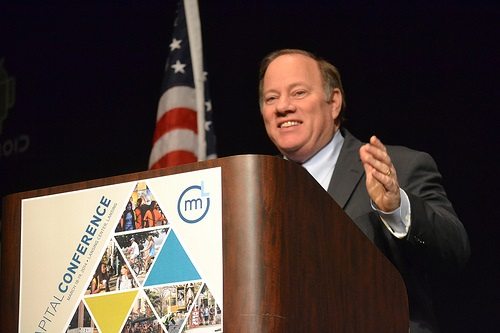
August 7, 2014; WDIV
In Detroit, it may be that the more things change, the more they stay the same, at least when it comes to the Water Department. With Mayor Mike Duggan’s accession to power over the Detroit Water and Sewerage Department (DWSD), maybe things will finally change, but the proof will be in the flow of water from the taps of tens of thousands of low-income Detroit Water customers who have been threatened with water shutoffs due to outstanding bills as low as a few hundred dollars.
Last week, Mayor Duggan announced a 10-point plan to get more residents to pay up while providing assistance to those water customers who needed help due to their low incomes. The elements of the plan include the following, most of which is pretty obvious, raising questions as to what might have been going through the minds of the Water Department’s leadership and emergency financial manager Kevyn Orr up to this point. (Comments and elaboration from NPQ are in parentheses.)
Sign up for our free newsletters
Subscribe to NPQ's newsletters to have our top stories delivered directly to your inbox.
By signing up, you agree to our privacy policy and terms of use, and to receive messages from NPQ and our partners.
- During the moratorium, which ends August 25th, DWSD will waive turn-on fees for customers whose water had been shut off, as well as all late payment penalties.
- Cut red tape (that is, for getting into a payment plan)
- Extend hours at DWSD Customer Care Centers (extending Customer Care Center operations by one hour on weekdays and four hours on weekend days)
- Increase staffing at the DWSD Call Center…Starting August 18th, the Call Center will have 50 percent more staff and new phone technology to better serve customers. (Remember that the Detroit City Council raked Detroit Water leaders—though not director Sue McCormick, who didn’t show up for the council hearing—for inadequate staffing of the call centers when tens of thousands of people were actually having their water turned off.)
- Cobo Water Fair…[to be] held at Cobo Center, Saturday, August 23rd to give customers one last opportunity to connect with all of the DWSD and community resources available to them before the moratorium ends August 25th.
- Improve notification for customers in danger of shut-off…. Workers also will hand-deliver notices to all homes in shut-off status one week before their scheduled shut-off to give them time to enter into a payment plan.
- Implement an Affordable Payment Plan (The plan changes the original “entry fee” for a payment plan from paying down 30 percent of the past-due balance to 10 percent.)
- Provide financial assistance for low-income Detroit customers (Beginning on August 11th, eligible residents will qualify for assistance up to 25 percent of their bills from the Detroit Water Fund, a partnership with the United Way for Southeastern Michigan which oversee prequalifying residents; the plan adds somewhat ominously, however, that the Water Fund funding “is subject to availability.”)
- Build Neighborhood Partnerships (This means that the department has “established a support network” to assist individuals who may not qualify for some of the DWSD assistance, with reference to partners such as United Way 211, THAW, and WAVE)
- Provide a clear way [for donors] to give [to the Detroit Water Fund]…by text message, by check or by phone
Detroiters who are facing water shutoffs and the nonprofit leaders who have helped bring this crisis to the attention of President Obama (with no noticeable corresponding action, by the way) and even the United Nations should tell Nonprofit Quarterly whether they think the mayor’s plan is going to make a substantive change in the Detroit water crisis or is simply a kinder, friendlier veneer for the department’s efforts to clear itself of mostly residential delinquencies.
The city’s larger agenda is still garnering suspicion in many quarters. After the debacle of how Detroit Water handled this crisis, the chief of the department, Sue McCormick, is still on the job. In other scenarios comparable to having turned the delinquent water bills of poor people into an international incident, McCormick would have been sacked.
Nothing in the plan addresses what we confidently suspect is a problem of inaccurate bills due to Detroit’s longstanding problem of leaking mains and leaking connector pipes. That is actually why the State of Michigan has been the largest delinquent customer of the Water Department, challenging the bills themselves. The plan also doesn’t address the additional fact that Detroit’s water rates are significantly higher than the national average, making affordability a problem for many residents. The mayor’s 10-point plan accepts the current bills as essentially accurate starting points for determining whether customers will have their running water turned off.
There is also suspicion that the Water Department’s longstanding exploration of privatization is supported by the Mayor. Sharda Sekaran, a co-founder of the National Economic and Social Rights Initiative, recently wrote that Duggan’s history of supporting privatization—in his case, the sale of the nonprofit Detroit Medical Center to a for-profit hospital conglomerate in Virginia—raises questions about the future trajectory of Detroit’s public water system. As the NPQ Newswire has noted, the history of turning public water systems over to private corporations has not been particularly successful, both here in the U.S. and overseas.
While the mayor’s plan was being rolled out for the public, in the bankruptcy court, the Water Department was proposing a possible strategy for dealing with the $5.2 billion in water and sewer revenue bonds it owes bondholders, aiming at getting bondholders to tender their debt in order to allow the City to go to the bond markets for refinancing. NPQ will keep an eye, to the best of its ability, on the Water Department dynamics that might or might not lead to changes in the protections afforded to Detroit water customers.—Rick Cohen













